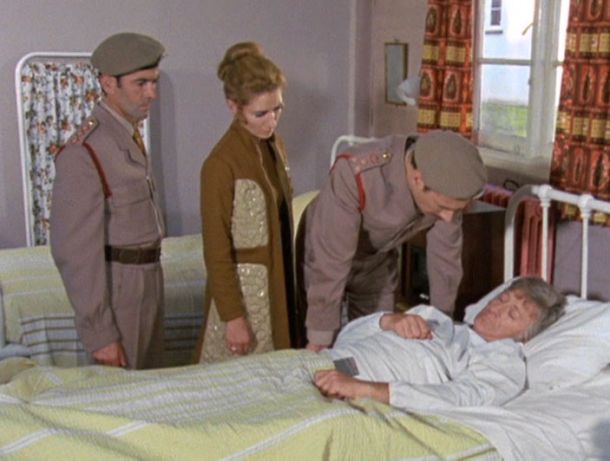
Context for those unfamiliar with Doctor Who
In the classic era of Doctor Who, stories were divided up into multiple episodes, in a serialized fashion. This story is four episodes long. The show follows The Doctor, the protagonist, on various adventures through space and time. In the last story, he was sentenced to exile on Earth. This article is part of a review of Doctor Who‘s seventh season.
It’s the 70’s, Doctor Who survived possible cancellation, the budget was cut, and the number of episodes was reduced. Did the show manage to be good? It was difficult to keep the train running smoothly when production was going on virtually all the time from 1963 to 1969. Perhaps the season breaks will do some favors to the behind the scenes members. Filming on Season 6’s finale, The War Games, most likely finished in April 1969. Filming for Season 7 most likely started in September 1969. While that break seems quite short, production had never been off for that long. I guess it takes extra time to change the format so drastically. A lot has changed. For starters, the show is now in color. The Doctor is now in exile on Earth with his spaceship serving little more purpose than set decoration. He’s aiding an organization called “U.N.I.T.”. Its objective is to stop alien threats from happening or escalating. This change of setup isn’t all new. The Web of Fear from Season 5 and The Invasion from Season 6 both feature U.N.I.T. for the first two times. The latter was a test to see if these Earth bound stories would be liked. Brigadier Lethbridge-Stewart and Sergeant Benton are both members of U.N.I.T. that appeared in the earlier stories and they’re back for this season (as well as later ones). They’re joined by Liz Shaw and numerous guest characters from U.N.I.T. Unusually, this season had only four stories, but most had more episodes than the common four or six. Let’s check them out, starting with the only story not seven episodes…
I vaguely remember watching Spearhead from Space on DVD. It’s nice to see it again in crystal clear HD. In fact, it’s the only Doctor Who serial from the original series filmed in a way where it could be seen in HD. There’s lots to love here. The directing is very good. All the performances are believable. The framing and camera angles look very sharp. Director Derek Martinus had done Who stories in the past, but none look as good as this one. There are dramatic cuts to and fro intense happenings in the story. A highlight is when someone is driving a car and someone else walks in the road from nowhere. The driver swerves off the road to avoid hitting them. There’s then a cut to the person’s bloodied face in the car as the person from the road walks up to them. Where are you going to see that other than from sharp directors? Another highlight is a cut from a person to a doll face. The camera then quickly zooms out to show characters talking. This kind of style probably was difficult for the BBC in the 70’s. Namely the use of blood. There are some awkward cuts, but they’re outnumbered by effective ones.
I’m glad that this story is so good as being the start of a new era of the show, it’s the perfect introduction to people not into (Classic) Doctor Who. This story goes against its era by being more or less quick and efficient in how it tells the story. Stories are generally slower paced in the Classics. There are some issues I have with the story, but they’re outweighed by how good it is.
SPOILERS
One great scene is when a villain goes to the house of an innocent lady. Her dog is barking and she tells the dog to shut up. The dog then suddenly is quieted. The worry on the woman’s face is quite effective. Though, it doesn’t make sense that the villain would kill the dog as doing so makes their presence known. They’re looking for something, not going on a killing spree. A shot a bit later shows a pan of broken furniture. That’s another effective shot. I’ve spoken before about disliking mindless death in Who. A character named Ranson is under protection by our heroes, but he’s killed suddenly. His death is annoying, but it’s directed very well. The villain just walks up to him and before he can react much, is shot.
At some points, the serial can be a bit too slow or a bit too fast. Dramatic tension is built in the first three episodes, but at points it’s a little too drawn out. Even if this serial has faster pacing than usually, it still has a bit of drag. We see people talking extensively when there could be a better way of showing that with visuals. The finale at the end was very quick. A more clever way of ending the threat would’ve helped this one a lot. The Doctor fires his fancy weapon at a monster and all is well. A lot of the final episodes of a story feel like a shoot ‘em up.
Probably the most effective horror scene I’ve watched in Who was when the henchmen of the villains appear on the streets and walk around. They start firing at whomever is around. No punches are held and it’s honestly terrifying to watch. How would you handle this situation? You’re just out in public and suddenly your life is threatened. One nice touch is how not everyone we see is killed. While we don’t see everyone escape, they probably did. Another sharp moment for the serial.





